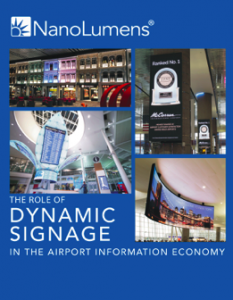Reaffirming its commitment to provide the market with ideas on how to better engage with today’s increasingly tech-centric travelers while improving the efficiencies of their operations, NanoLumens, award-winning creators of uniquely compelling interactive LED visualization solutions, this week announced the availability of a new white paper focused on how advanced visualization solutions are playing a key role in defining the contemporary airport terminal experience.
 NanoLumens Vice President of Global Marketing and Business Development Joe’ Lloyd told us “On average, more than 65-million people now pass through each of the ten busiest United States airports annually. Many thousands more arrive and depart each day as airport and airline employees. These numbers increase annually and, as they do, the infrastructure constraints of each airport and the expectations of each traveler and airline increase accordingly”.
NanoLumens Vice President of Global Marketing and Business Development Joe’ Lloyd told us “On average, more than 65-million people now pass through each of the ten busiest United States airports annually. Many thousands more arrive and depart each day as airport and airline employees. These numbers increase annually and, as they do, the infrastructure constraints of each airport and the expectations of each traveler and airline increase accordingly”.
“Pressure is constantly mounting on airports to optimize their efficiency, enrich the experiences of their passengers, and maximize the long-term viability of their existing infrastructure. As these pressures diversify and expand, so too must the solutions airports integrate to counter these demands. As with any transportation hub, the on-site experience for customers and businesses in an airport is intimately tethered to the availability of communications. The logistics of moving these passengers and employees through vast concourses on tight schedules can be impossibly complex, but precision and pragmatism are essential for a successful experience. Such a daunting challenge requires comprehensive communication tools to ensure that processes run smoothly, safely, and on time but there are few technologies capable of effectively delivering broadly applicable yet highly specific real-time information to vast groups of transitory audiences”.
According to Lloyd, the most effective solution that consistently accomplishes this objective over time is dynamic signage. Dynamic digital signage solutions, specifically of the commercial LED variety, dramatically improve access to information. Visible from much greater distances than traditional signage and more effective at standing out amidst a sea of distractions, dynamic signage frees passengers to behave autonomously and frees airport administrators to focus on their own operations rather than the needs of individual passengers.
The white paper spotlights specific airports that are ahead of the curve in realizing the full benefits of integrating LED visualization solutions into their terminal operations. Highlighted airports include John F. Kennedy Airport in New York, Changi Airport in Singapore, the Toronto Pearson International Airport, the Vancouver International Airport, McCarran International Airport in Las Vegas, Stansted and Heathrow Airports in London, and the Charlotte Douglas International Airport in Charlotte, North Carolina, among many others.
The new white paper, entitled ‘The Role of Dynamic Signage in an Evolving Airport Environment‘, is available for download here.

Follow DailyDOOH